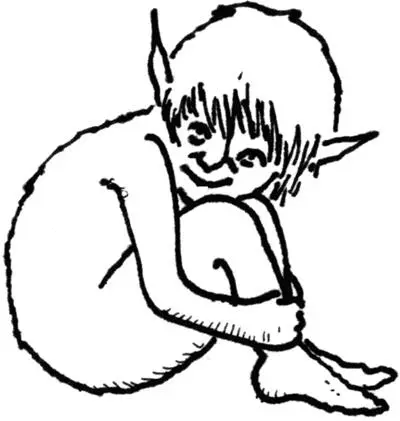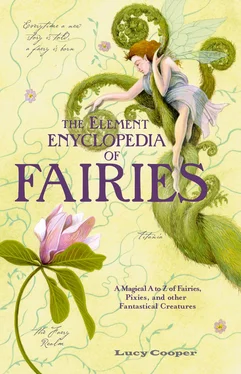Briggs served as president of the British Folklore Society for three years; an award was named in her honor after her death in 1980.
See Brigit .
(Or Brighid.) In Celtic mythology Brigit is a daughter of the Tuatha de Danann in Ireland, a pagan goddess of poetry and smithcraft, possessing the powers of divination and healing.
Legends of her birth say she was bathed in milk and would take only pure milk from a fairy cow with white skin and red ears as her sustenance. Her birth is celebrated on the ancient Celtic festival of Imbolc in February when, in Scotland, the old woman of winter, Cailleach , drinks from the Well of Youth and metamorphoses into Bride, who, with her white wand, heralds the growth and regeneration of spring. By the hearthside a bridie doll of corn is left with offerings of bread and milk to ensure protection and abundance.
In the Dreamtime Aboriginal myths of Australia, Brolga was a girl who was famous for her graceful dancing. A malicious sorcerer desired her as a wife, but he was rejected. As she danced alone one day she was engulfed by a whirling dust storm, which left behind no trace of her—the spurned magician had exacted his revenge and changed her into a beautiful silver-gray bird whose dance imitated the elegant movements of her arms. The Brolga bird dances to this day in northern Australia.
In Popular Tales of the West Highlands (1860–1962), J. F. Campbelldescribes the brollachan , from the Gaelic for a shapeless, deformed being, as having eyes and a mouth but no discernible shape and only the two words “myself” and “thyself” at his command.
The story tells of a lame young miller boy lying beside his fire in the mill when the brollachan enters and keeps him company. As the fire burns low, the boy throws on another peat and an ember jumps out onto the brollachan , who shrieks and howls loudly. His mother, a fuath ( see Fuathan ), bursts into the room and demands to know who is responsible for burning him. The brollachan can only reply, “Myself and thyself,” with which she has to be content, while the crippled boy hides beneath a sack and prays for his own safety. The fuath , not satisfied, chases a lone woman to her home and, just as she enters the door, tears off her heel in revenge. The woman is left lame for the rest of her life.
In Shetland the tale is told of the King of Trows. His name was Broonie and he was responsible for guarding the corn. Farmers were glad of his benevolent spells as he sped from farm to farm, but Broonie liked to be left alone and would scatter the corn stooks hither and thither if he was disturbed. As the nights became colder, the good folk decided to make him a gift of a cloak and hood, and placed them so he would find them. But Broonie scorned the kind gift and left the neighborhood forever.
In a Suffolk tale, a tiny “frairy” (the local dialect word for fairy) is caught in a farmer’s barn and cries out the name of Brother Mike in despair while struggling to escape.
A dwarfdwelling near the Keeldar Stone on the lonely moors of Northumberland. He is dressed all in brown and of a squat and stocky appearance, with a head of wildly curling red hair and glowing eyes. He is a jealous guardian of wild creatures and fiercely defends his territory from huntsmen trespassing on his land.
A household spirit in the folklore of Scotland and northern England, generally described as a shaggy-haired little man about 3 feet (1 meter) tall, sometimes dressed in shabby brown clothes and sometimes naked. Meg Mullach, or Hairy Meg, is an example of a female brownie, but in most accounts they are male.

Brownies attached themselves to a particular household or farm. They came out at night to complete tasks left unfinished by servants or farm laborers, tending to livestock, threshing grain, reaping crops, cleaning the house and barns, churning butter, and taking care of numerous other chores. In return, housewives left out treats, placing a bowl of cream, or a tidbit of freshly baked bread or cake where the brownie was likely to find it by chance. It was important not to offer a brownie direct payment for his services, as this invariably led to his departure. Some say this was because brownies were only bound to work until considered worthy of payment; others that the brownie was too much of a free spirit to accept the bondage of human clothes or wages. The Cauld Lad of Hiltonis one of many examples of a brownie who ceased his services when he was given the gift of clothing. In Cornwall, a piskysometimes performed a similar role to a brownie, helping with the threshing of the corn. But when the pisky thresherswere given new clothes, they vanished, never to return. In one unusual case a Lincolnshire brownie was annually given a linen shirt. One year the farmer substituted a shirt of coarse hemp and the brownie took offense at the poor quality of the garment and left.
Criticizing a brownie’s work was another sure way to cause offense and turn him from an industrious helper into a troublesome, mischievous boggart. However, when treated with respect, a brownie was very loyal to the master or mistress of the household, chiding and scolding lazy servants and laborers, and even fetching the midwife when his mistress went into labor.
See also Aiken Drum , Bodachan Sabhaill , Boggart , Bongas , Brownie-Clod , Bwbachod , Bwca , Tom Cockle , Dobbs , Dobie , Fenodoree , Gruagach , Haltija , Hob , Hobgoblin , Kaboutermannekin , Killmoulis , Kobold , Kodinhaltia , Korrigan , Niagriusar , Nisse , Phouka , Portunes , Puddlefoot , Redcaps , Silkies , Urisk , Wag-at-the-Wa’ .
A brownieof the Scottish Highlands with a frolicsome temperament, always playing tricks and with a tendency to throw grass clods at passing strangers, hence his name. A simple being, he was tricked into taking on the task of threshing as much corn as two men for the whole winter by the promise of a cape and hood. The tricksters eventually relented when they saw how hard he worked and gave him the clothes, whereupon Brownie-Clod stopped work in a flash and made off with his gift.
A Cornish spirit inhabiting the shoreline between high and low tide, to whom fishermen left offerings of fish in order to ensure a good catch in their nets.
The Cornish tales of William Bottrellin Traditions and Hearthside Stories of West Cornwall (2 vols, 1870–1973) name two buccas , Bucca-dhu (Black Spirit) and Bucca-gwidden (White Spirit) and Bucca-boo as a corruption of the former, meaning “Old Nick, or one of his near relations.”
Читать дальше













